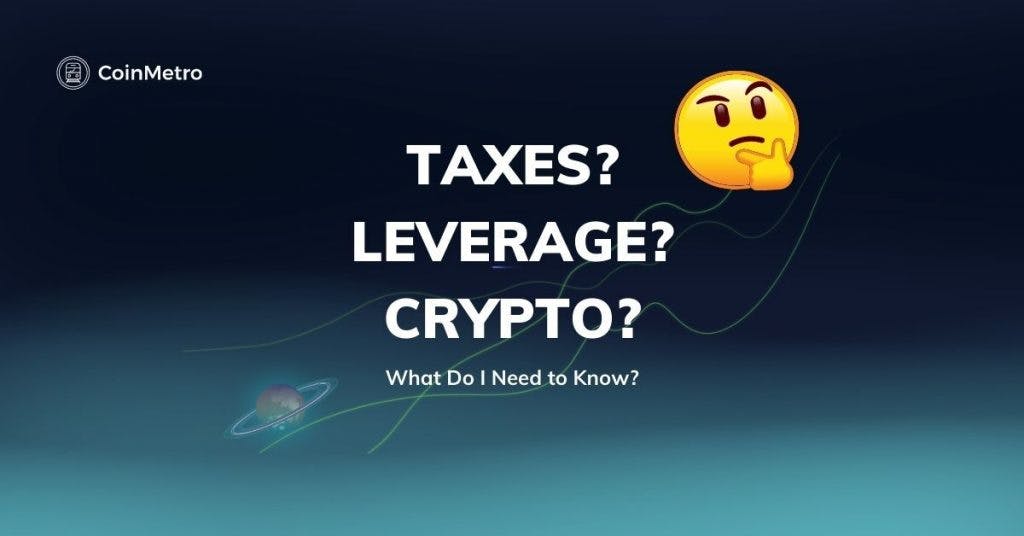Learn About Crypto Taxes of Leverage Trading
5 de diciembre de 2025

by Kamil S
5 de diciembre de 2025
Doing taxes on crypto has been a wanted topic for several years. Even more so with margin and leverage trading.
How to do your crypto taxes if you are trading on leverage? Let’s learn what’s there to know about crypto taxes in leverage trading – in this guide.
Navigating all the different regulations related to cryptocurrency taxation is certainly not an easy task. Leveraged trading makes it even more difficult.
If you have used crypto exchanges – like CoinMetro, for example – to trade on leverage/margin, this guide is for you.
We won’t bore you with the definition of leverage trading. Let’s assume that if you’re reading this, you must know what the deal is.
Craving more information on this popular yet tricky strategy? Here’s our comprehensive guide to leverage trading.
The existing tax rules and regulations on leverage trading are quite complex and depend on certain factors.
As a general rule, when trading a digital asset, you need to calculate capital gains for each transaction. However, it’s different for leverage trading.
When it comes to leverage trading, there are no direct taxes on any transactions. Instead, taxes apply on either the gain or loss that results from trading activity.
A considerable number of tax authorities fail to provide clear guidelines on how to do crypto taxes with leverage trading. Bottomline is, before doing any crypto taxes, please consult your local tax office how to apply.
That said, we would like to point out some critical steps to always keep in mind when trading on leverage – to simplify filing leverage trading taxes later.
The majority of crypto exchanges do all the work for you by letting you export a CSV or a XLSX file containing your complete trading history.
Why is this important? You will need the data if you get audited by a tax authority.
With cryptocurrency tax software, you can compile and upload all of your cryptocurrency activity and have the software handle all the calculations and reporting for you.
For many of us, this can make cryptocurrency tax reporting a lot less stressful.
You need to calculate the resulting gain/loss for every single closed position. For your information, some exchanges will automatically keep track of all your crypto transactions and calculate the resulting gains from leverage trading – if, for some reason, you can’t do it manually.
Don’t avoid filing crypto taxes. As ardent supporters of crypto regulation, we ask you to stay compliant and file your taxes annually. The more you ignore them, the worse they get.
What happens if you don’t? You may want to know that certain tax authorities get data containing all the personal details directly from some crypto exchanges.
Keeping track of every transaction from leverage trading and reporting them on time is essential. If you try to avoid reporting and paying your crypto taxes, thus failing to meet your legal duties, you risk attracting fines and penalties, which could have a significant impact.
Even though doing crypto taxes with leverage trading can be a complicated process, there are plenty of tools available to simplify tracking and calculating your taxes.
Etiquetas
Artículos relacionados

Blockchain en la educación: transformando el aprendizaje y la acreditación
¿Qué pasaría si tu expediente académico pudiera verificarse al instante, en cualquier lugar del mundo? Esta es solo una de las preguntas que reflejan…
7m

Cómo comprar Ethereum (ETH) en Coinmetro - paso a paso
¿Quieres comprar Ethereum al instante sin complicaciones? Coinmetro lo hace rápido, sencillo y seguro. Esta guía te muestra los pasos simples para…
3m

Cómo hacer staking de Ethereum (ETH) en Coinmetro de forma rápida, sencilla y segura
¿Quieres ganar ingresos pasivos con tu Ethereum? Con Coinmetro, hacer staking de ETH es un proceso fluido, seguro y fácil para principiantes. En esta…
3m

El papel de la cadena de bloques en la trazabilidad de la cadena de suministro
En 2021, un escándalo sacudió al sector alimentario. Varios proveedores habían etiquetado carne caducada como si fuera fresca. El resultado fue la…
11m